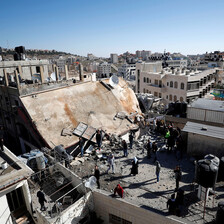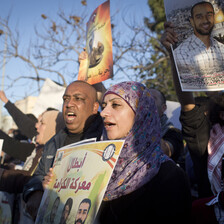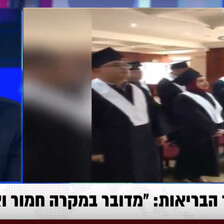The Electronic Intifada Dheisheh refugee camp 25 February 2015

Mourners carry the body of Jihad al-Jafari, 20, who was shot dead on the roof of his house by Israeli soldiers raiding Dheisheh refugee camp, near the occupied West Bank city of Bethlehem, before dawn on Tuesday.
APA imagesJihad al-Jafari, a young Palestinian refugee, was shot dead by an Israeli soldier this week. He had been resisting the occupation of his homeland by throwing stones at Israeli forces.
At around 3am on Tuesday morning, Israeli soldiers raided Dheisheh refugee camp, south of Bethlehem in the occupied West Bank.
As the soldiers tried to arrest a Palestinian man outside the camp, local youth tried to block them with rocks and Molotov cocktails. The Israeli soldiers fired tear gas and live bullets.
Al-Jafari was on the roof of his home when he was shot. He had celebrated his twentieth birthday earlier this month.
“Similar to an execution”
“He was always among the first guys to come out and face the soldiers whenever they raid the camp,” Omaima Abu Aisheh, a friend and neighbor of al-Jafari, told The Electronic Intifada. “He was throwing stones when an Israeli sniper shot him with a bullet in his chest. He died on the spot. We couldn’t even find a drop of blood on the roof.”
Ma’an News Agency quoted forensic expert Sabri al-Aloul saying that al-Jafari’s autospy showed that the youth bled to death after a live bullet penetrated his left shoulder and struck his lungs before exiting and causing severe bleeding in his arteries and around his spine.
The killing was “similar to an execution” because he was shot from very close range, al-Aloul told Ma’an.
Al-Jafari had been studying hotel management at Talitha Kumi Community College in Beit Jala, another West Bank village. He had hoped to become a chef.
Al-Jafari had been active in the Al-Aqsa Brigades, a militia linked to Fatah, that was demobilized as part of an agreement with Israel. But eyewitnesses are clear that al-Jafari was unarmed and resisting with stones when he was shot dead.
“I always told him to focus on his studies instead of putting his life in danger, but he loved Palestine too much,” his mother Hanan told The Electronic Intifada. “He always dreamed of seeing Palestine free and returning to Deir Rafat, our original village [located west of Jerusalem] before the Nakba.”
Nakba (Arabic for catastrophe) is the name Palestinians give to the ethnic cleansing of Palestine by Zionist forces in the 1940s. Dheisheh camp was set up to provide temporary shelter for 3,400 refugees displaced from 45 villages in the Jerusalem area. Today, it has a population of around 20,000.
Palestinians living in this area are accustomed to raids by Israeli forces. One day earlier, Aida refugee camp — also in the Bethlehem area — was attacked by Israel. Several Palestinians were injured.
Dheisheh itself tends to be raided on a weekly basis — usually during the night or before dawn. It is only when somebody is killed that the raids receive attention.
“PA doesn’t represent us”
Al-Jafari was a supporter of Fatah, the political faction headed by Palestinian Authority leader Mahmoud Abbas. Yet representatives of all the main Palestinian political parties attended his funeral later on Tuesday.
A day of mourning was declared throughout the camp, with all shops and schools closing their doors. Hundreds attended his funeral following midday prayers.
There was some tension at the start of the funeral procession, when local youths refused to allow a car supplied by Palestinian Authority security forces to carry al-Jafari’s body. His friends insisted on carrying him to the cemetery on their shoulders.
The PA has been heavily criticized by Palestinians for its cooperation with Israel. Abbas has described cooperation with the Israeli occupation as “sacred.”
Hammam Sbeih, a teenager from the neighboring village of al-Khader, said: “Even youth in the camp who are affiliated with Fatah are angry at the Palestinian Authority and think that it does not represent us. So they did not feel it was right for a car from the national security to carry Jihad’s body.”
The short life of Jihad al-Jafari was eerily similar to that of Mohammad al-Araj, a high school student shot dead by Israeli forces on his seventeenth birthday last July. He had been attending a protest at Qalandiya checkpoint between Jerusalem and Ramallah.
Both of these young men were aspiring chefs. Both had lived in refugee camps. Both died as they confronted heavily armed Israeli soldiers with nothing more than stones.
It is little wonder that so many people paid their respects to Jihad al-Jafari and his family. Palestinians are acutely aware of how Israel thwarts the ambitions of the young, preventing them from living normal lives.
Budour Youssef Hassan is a Palestinian anarchist and law graduate based in occupied Jerusalem. She can be followed on Twitter: @Budour48.





